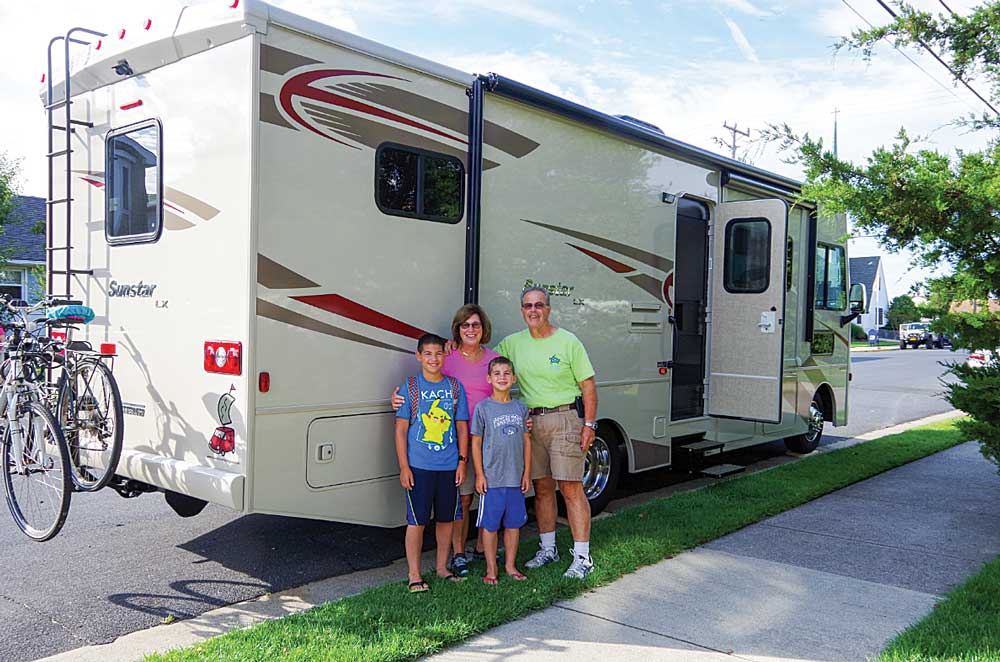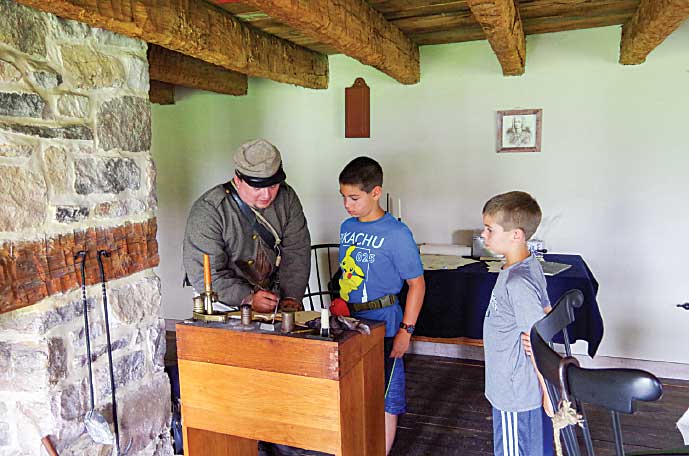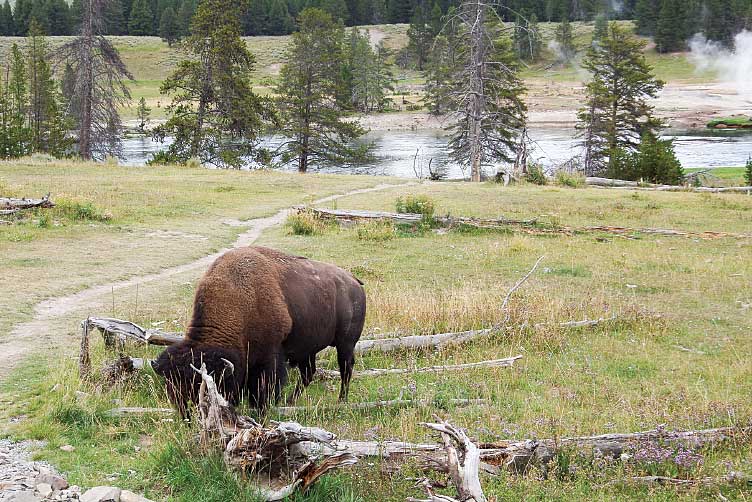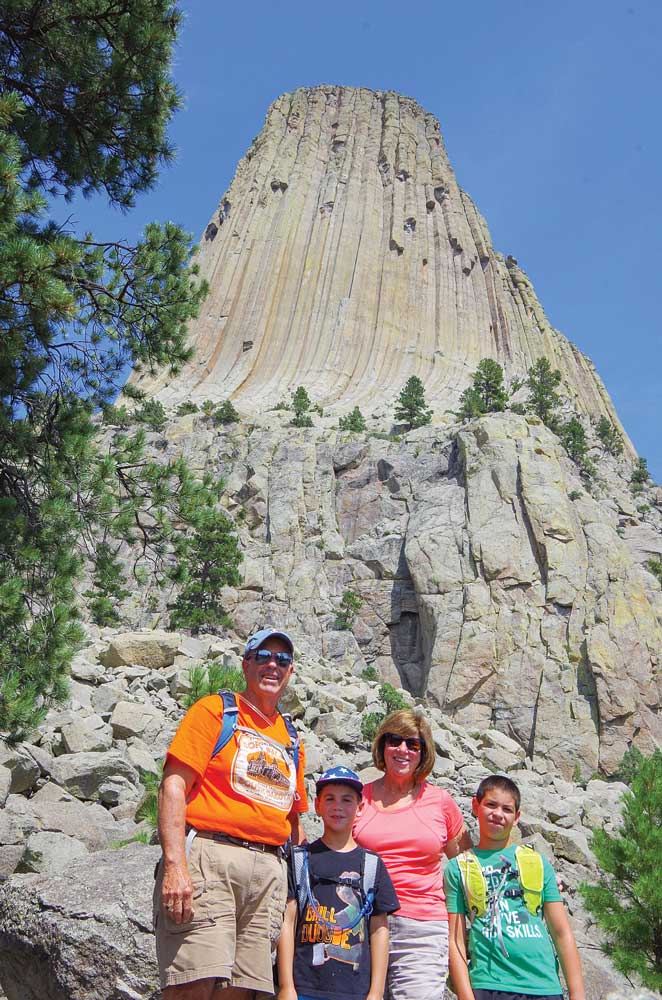One total solar eclipse, tow grandkids, 10 days and 2,395 miles equals memories that last a lifetime!
Each September, we leave our home on the East Coast and head out in our motorhome for months of RV travel. Last year, we changed our plans so we could get a good view of the once-in-a-lifetime full solar eclipse on August 21. We wanted to visit Yellowstone National Park and the Tetons, too, so we moved up our trip a month to coincide with the path of the eclipse, which would cross directly over Jackson, Wyoming. But August is also our month to watch our grandkids since school is out for the summer, so we asked our son, Dan, and his wife, Liz, if we could take our grandsons, Jack (age 11) and Logan (age 8) along with us.
As soon as they gave us their blessing, we went to work revising our itinerary; we also had to ask Jack and Logan what they thought about all of this. In typical grandpa fashion, I started telling them about the trip and the attractions along the way. “We’ll visit Yellowstone,” I began. “Isn’t that the place with geysers?” they asked, excitedly. “Yes, and we’ll see the World’s Only Corn Palace, The Badlands, Devils Tower, miles of corn, wheat and cows, and even cowboys!”
That did it – now everyone was excited about the plan.
Trip Preparation
Both Jack and Logan had traveled with us before in our motorhome for short three- or four-day trips, which had always been destination-based, but we wondered how it would be for them to spend more than 10 days traveling cross-country. That would require preplanning. Ruth and I worked out an adventure in advance for each day that the kids could look forward to. We’d include lots of stops along the way, special end-of-the-day activities, and even a workbook (fun and educational) for each of the grandkids. We reduced our normal driving time as much as possible (to less than six hours) in order to allow the kids to have time for playing, running and sightseeing.
In-Vehicle Activities
We wanted to limit the kids’ time spent on electronics – after all, there would be too many sights to see – so we created an activity sheet for every stop. Based on the ages of the kids, we included coloring pages, multiple-choice fact sheets, word search games and reading material. We discovered that many of the national parks offer worksheets and touring tips for kids on their websites.
We chose movies (particularly great for a rainy day) that were relevant and would add interest and wonder to the travel sites. Did aliens really land at Devils Tower (“Close Encounters of the Third Kind”)? Did a snail really win the Indy 500 (“Turbo”)? We’re not telling!
Ruth and I like to listen to audiobooks to help the drive-time pass. We thought “Adventures of Huckleberry Finn” would be a hit, since we planned to spend a night camped along the Mississippi River. Unfortunately (or was it fortunately?), Huck Finn was not of interest to our grandkids. They had enough activities to keep them engaged as we drove across the country.
Good ol’ fashion travel games never go out of style. We played I Spy, Spot the State Plate and our favorite – “Name the farmer’s crop.” Soon Jack and Logan became experts. “Corn, corn, beans, corn, beans, beans, corn, corn …” all correctly identified as we drove across the Midwest.
Outdoor Activities
Whenever possible, we stopped for a hike, which was a great way to stretch our legs and to teach the boys about trail etiquette. We also allowed time to stop at a playground at the end of each day’s drive so the boys could get some physical activity, which guaranteed them a good night’s rest. We also enlisted Jack and Logan’s help with setting up at each campground. Nighttime brought campfires, s’mores and stargazing.
Day 1: The Trip Begins
327 Miles
U.S. Army Corps of Engineers Outflow Camping in Confluence, Pennsylvania
We left in the morning, with hugs from Mom and Dad. Our first stop was at a real fort – Fort Frederick, Maryland. It was a great stop for lunch after a four-hour drive. We toured the fort and saw a live musket demonstration; what kid wouldn’t like that! The boys also got to hold a musket, hear from a “real” red coat, write in a logbook with a quill pen and see the sleeping and eating quarters of early American soldiers. After several hours at the fort, we were ready to hit the road , traveling for our first overnight at Youghiogheny River Lake, which spans the Mason-Dixon Line between Pennsylvania and Maryland. Though rain was threatening, the boys were eager to play at the campground’s playground.
Day 2: Ohio to Indiana
385 miles
S&H Campground in Greenfield, Indiana (www.sandhcampground.com)
This was mostly a driving day – across Ohio and into Indiana. We ended the day at a private campground just before Indianapolis. We had built up the “wonders” of this night’s campground, as we chose S&H Campground for its swimming pool, miniature golf course and “Fun Park.” Logan shouted, “This is paradise!” when we drove in. Although we were somewhat disappointed that the inflatable climbing structures at the Fun Park were deflated, and the pool and mini golf were in need of upkeep, it didn’t seem to detract from the kids’ enthusiasm, and they were busy and happy. That evening, we watched “Turbo.”
Day 3: The Brickyard
295 miles
U.S. Army Corps of Engineers Fishermans Corner campground in Hampton, Illinois
This would turn out to be Logan’s favorite day – a half-day at Indianapolis Motor Speedway. Having watched “Turbo” the previous night, where a snail may or may not win the Indy 500, we were ready to “kiss the bricks.” Being a little concerned that we wouldn’t clear the entrance into the museum with our 12-foot 4-inch-high motorhome (we made a call in advance and were assured that tractor trailers regularly make the drive), we swooped under the speedway track and found ample RV parking. We boarded the tram and drove the 2.5-mile track, stopping at the finish line to “kiss the bricks.” Logan discovered tire rubber on the track, and was thrilled with this souvenir. Next we walked the museum, filled with memorabilia from almost all of the Indy car winners for the last 100 years; even Turbo was there! We continued our drive through the corn belt, ending up at Fishermans Corner campground, an Army Corps of Engineers facility right on the Mississippi River. After a campfire by the river, it was time for bed.
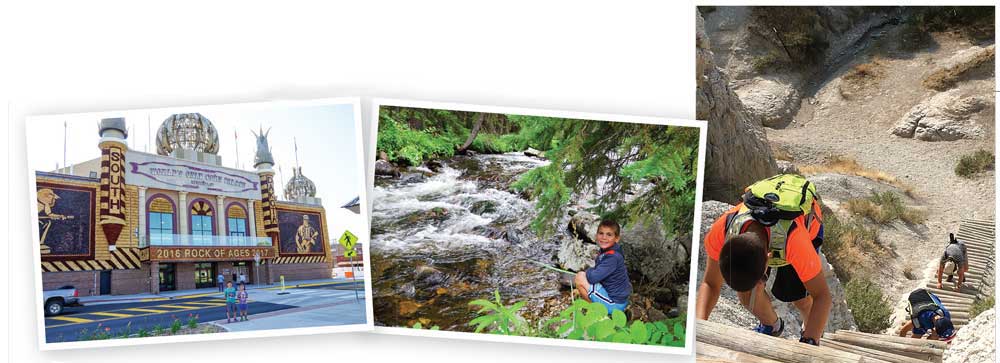
Exploring a variety of sights and activities kept the boys interested and excited about things they had never seen or done before: The World’s Only Corn Palace and its mosaics made of colored corn, a rushing mountain stream in Wyoming, and climbing a trail in Badlands National Park.
Day 4: Forest City, Iowa
250 miles
Pammel Park in Forest City, Iowa
We headed to our motorhome’s birthplace, the Winnebago factory in Forest City, Iowa. Because this was a pretty long driving day, we agreed to allow the boys to use their electronic devices, and they learned about “hotspots.” We camped at the city park – Pammel Park – where we played the entire disc-golf course, and then met a local farmer who stopped at our campsite to give us free sweet corn from his field. The kids got to meet one of the Midwestern farmers who help to put food on our table. They were impressed by the kindness and generosity of the farmer, who refused payment for his corn. And we all agreed it was the best sweet corn ever! That night we watched “National Treasure 2.”

On Day 5, we camped at Lake Mitchell in South Dakota, and had a picnic dinner with more fresh corn – the best sweet corn we ever had!
Day 5: Iowa to South Dakota
252 miles
Lake Mitchell Campground in Mitchell, South Dakota (www.cityofmitchell.org/448/Lake-Mitchell-Campground)
We packed up early and rolled into the Winnebago Visitor Center, where we signed in for our 9 a.m. factory tour (https://winnebagoind.com/company/visit). As we were led through the facility, Jack and Logan were amazed at what went into building a motorhome, especially some of the highly specialized equipment. Leaving Forest City, we headed to Mitchell, South Dakota, for a campsite at Lake Mitchell.
Day 6: South Dakota
226 miles
Cedar Pass Campground in Badlands National Park, South Dakota (www.nps.gov/badl/planyourvisit/camping.htm)
First stop this morning was the “World’s Only Corn Palace.” There were plenty of “gifts” to peruse, along with popcorn in all shapes, sizes, colors and flavors! But this was only the beginning, since Logan had already discovered the Great American Gift Shop … fearing each one would be his last. We had to reassure him that everywhere we went there would be a gift shop. But our stop later that day at Wall Drug probably surpassed them all. We then drove through Badlands National Park, where we also camped for the night. “Is this the Grand Canyon?” the boys asked, peering down into a deep crevasse. They were thrilled that this park actually encouraged climbing around on the rocks (safely, of course). We ended the day with one of the park’s Night Sky Programs, which included a star watch and a meteor shower!
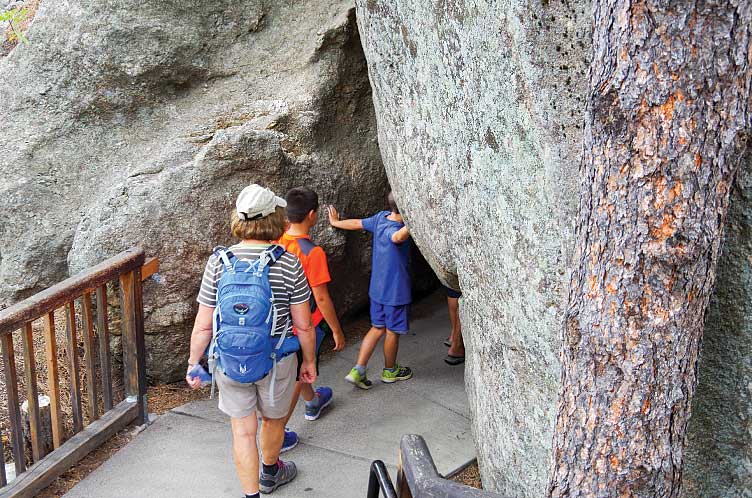
Also in the Black Hills, we discover the “hidden” passageway in the rocks below Mount Rushmore where, thanks to the magic of a Hollywood blockbuster, we think the gold might be hidden.
Days 7 & 8: The Black Hills
200 miles
U.S. Forest Service Horsethief Lake Campground in Black Hills National Forest, South Dakota
When we began planning this trip, we reviewed a number of possible travel options with Jack and Logan, and Mount Rushmore got everyone’s vote. For reasons we couldn’t comprehend, both of them thought this would be the highlight of the trip. A few nights earlier, we had seen “National Treasure 2,” which ends at Mount Rushmore. Arriving at this monument, both grandkids wanted to see the secret cavern under the carvings where all of the gold was hidden. Oops, guess the gold was removed! We also stopped at Crazy Horse Memorial and, of course, the gift shop. Next, we drove on the Peter Norbeck Scenic Byway to see bison, donkey, deer and pronghorn sheep. Wild animals always rate well with kids. Even more was planned, with a tour of Jewel Cave the following morning and Custer State Park.
Day 9: Devils Tower
270 miles
U.S. Forest Service South Fork Campground in Bighorn National Forest, Wyoming
Today’s first stop was Devils Tower, and again we preceded this with a movie, “Close Encounters of the Third Kind.” A 1.3-mile walk around the entire base trail, watching the climbers, was a favorite. But where were the aliens? For the evening, we chose a U.S. Forest Service campground between Buffalo and Cody, Wyoming. Camped right along a rushing stream, the kids were mesmerized by the water bouncing off the rocks and the fields of wildflowers.
Day 10: Cody, Wyoming
190 miles
U.S. Forest Service Wapiti Campground on the North Fork of the Shoshone River near Cody, Wyoming
This was our last day alone with Jack and Logan; their parents were flying in to Cody late that evening. We drove to Thermopolis, an unscheduled “find,” and spent a few hours in the hot springs, pools and water slides. Then we toured the Cody area, including the Heart Mountain War Relocation Center before arriving at Wapiti Campground, where Dan and Liz met us.

Reunited with Mom and Dad in Yellowstone National Park, the boys marvel at the geysers while sharing stories of their cross-country trip.
For the next few days, with parents on the premises, we backed off to allow them to show their kids the wonders of Yellowstone and Grand Teton national parks. We were all together for the eruption of Old Faithful, but then we went on our own hikes, while their parents took the kids to see the rest of the wonders.
So, what did we learn? As mentioned earlier, planning daily activities added to the fun of the trip. Between the project books we created, the attractions along the way, time allotted for playgrounds and the occasional Wi-Fi session, it all added up to a great cross-country trip.
It’s also important to know your grandkids. Jack loves math and science, while Logan loves gift shops. The campground playgrounds – where the boys could really work off stored-up energy and interact with other kids – were a huge success, and only dusk falling could get them to come in for the night. They both loved to get outside for hikes (usually 1 to 3 miles) and evening campfires. We made sure to include those as often as we could.
As for the Great American Eclipse, it proved to be the perfect end to our trip for the ages.
A few considerations before embarking on this type of adventure
Thinking through some of the questions below, and discussing them with your grandkids and their parents, will help make the trip go more smoothly.
How well do you know your grandchildren? Have they spent multiple days with you without their parents? What is their capacity for traveling, especially if long distances are in the mix? How can you pace the trip to meet the needs of the kids? What will the plans be for touching base with Mom and Dad?
What do they like to eat? What activities do they enjoy? What will the rules be regarding electronic devices? How will spending allowances be determined? What tasks can each child handle to understand the importance of their participation in making a positive trip? What will the sleeping arrangements be? How is discipline handled at home, and how will you be expected to manage any issues that may arise?
What medications do you need to bring along? How would you handle a need for emergency medical care?

